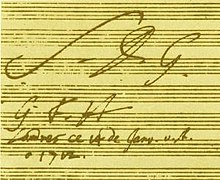Solos Deo gloria

Soli Deo gloria "God alone [be] the glory" (seldom wrongly meaning "the glory of the only God") is a Latin phrase that was used a lot in the early modern times and which, as a religious principle, is often the fifth to the (four) "Solas" the Reformation counts. It says that God alone is due to worship. In addition to the Soli Deo Gloria, the Reformation churches include the principles of solus Christ ("only Christ"), sola scriptura (Latin; "solely through Scripture"), sola fide (Latin; "solely through faith") and sola gratia (Latin; "only through grace").
In music
The words, mostly in the abbreviation S. D. G. , were put at the beginning or at the end of their scores by various composers of the Middle Ages and the Baroque . Sun signed Johann Sebastian Bach and George Frideric Handel many of her works with this signature. The abbreviation can still be seen in an artistic design on the historic pulpit of the Bach Church in Arnstadt .
In literature and in book printing
Authors such as Johann Gottfried Gregorii or book printers such as Johann Michael Funcke put this Latin phrase at the beginning or at the end of a book in the 18th century.
Trivia
In the Roman Catholic Church, the pileolus is also known as Soli Deo . It is part of the official costume of the bishops in and outside of the liturgy, but unlike other headgear, it is not removed when greetings - only at mass during the sacramental presence of Christ, ie "before God alone".
See also
Web links
Individual evidence
- ↑ soli Deo gloria. In: DUDEN. Bibliographisches Institut GmbH - Dudenverlag, accessed on October 15, 2016 .
- ↑ Soli deo gloria - Johann Sebastian Bach as a Protestant Christian. In: Press Releases - Press Archive 2000. Evangelical Church in Germany, June 29, 2000, accessed on October 15, 2016 .
- ↑ Don Samdahl: Handel's Messiah. In: doctrine.org. 2014, accessed on October 15, 2016 .
- ^ Carsten Berndt: Melissantes: a Thuringian polyhistor and his job descriptions in the 18th century; Life and work of Johann Gottfried Gregorii (1685–1770) as a contribution to the history of geography, cartography, genealogy, psychology, pedagogy and professional studies in Germany; [A Thuringian geographer and universal scholar (1685–1770)] , Rockstuhl, 2nd edition Bad Langensalza 2014, ISBN 978-3-86777-166-5 , pp. 58–69
- ^ Pileolus / Soli Deodorant. In: Bishop - Pontificals. Diocese of Magdeburg - Press Office, accessed on October 15, 2016 .

